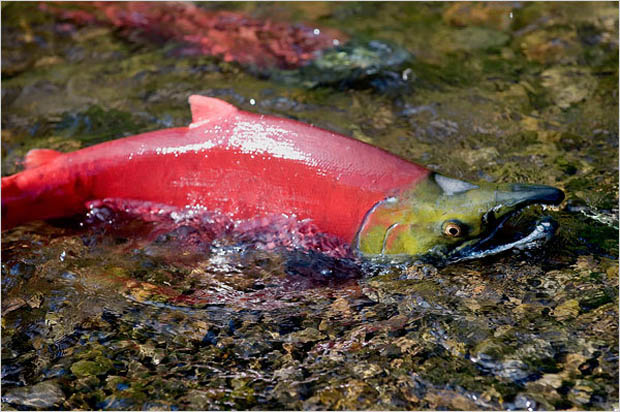New group targets Pebble in ads, and EPA in its quest to restrict mining
By LISA DEMER — ldemer@adn.com
![]() [dropcap]I[/dropcap]ts biggest investor is gone and its staff and contractors have been cut to the bone, but the Pebble copper and gold prospect is drawing fresh heat from a newly formed organization made up of old adversaries of the mine project.
[dropcap]I[/dropcap]ts biggest investor is gone and its staff and contractors have been cut to the bone, but the Pebble copper and gold prospect is drawing fresh heat from a newly formed organization made up of old adversaries of the mine project.
The new group is Bristol Bay United, formed by leaders of the Bristol Bay Native Corp., the sportfishing advocacy group Trout Unlimited, and a commercial fishing group called the Bristol Bay Regional Seafood Development Association.
On Wednesday, it began a media blitz of television ads that stress the importance of Bristol Bay sockeye salmon to residents and that aim to coalesce public opinion against Pebble. The advertisements feature a commercial fisherman, a lodge owner, and an Alaska Native woman with the message that thousands of fishing-related jobs could be lost if the mine were built and leaked waste. The words “Pebble Mine: Not Worth the Risk” flash at the ad’s end.
The Pebble prospect includes the headwaters of two rivers that contribute to Bristol Bay’s sockeye salmon runs, the biggest in the world.
Bristol Bay United’s real target of persuasion, though, is the Environmental Protection Agency. The EPA has powers under the Clean Water Act that it could use to veto the project. That’s what a group of Alaska tribal entities and village corporations petitioned the EPA to do back in 2010. The EPA didn’t take that approach but launched an intensive study of a big mine’s impact on the Bristol Bay watershed. A final version of the study is nearing completion.
The new group isn’t seeking an outright veto. Instead Bristol Bay United wants the EPA to insist on strict restrictions put any mining projects in the area, the group’s leaders said.
Specifically, it wants a ban on any dredged material being discharged into salmon habitat. It wants any mine project to follow state water quality standards and ensure that any discharged material isn’t toxic to aquatic life. And it doesn’t want any project runoff or seepage of fill to require “treatment in perpetuity.”
“It’s the restrictive part that we are really focused on,” said Jason Metrokin, chief executive officer of the Bristol Bay Native Corporation.
To read complete story click here […]



